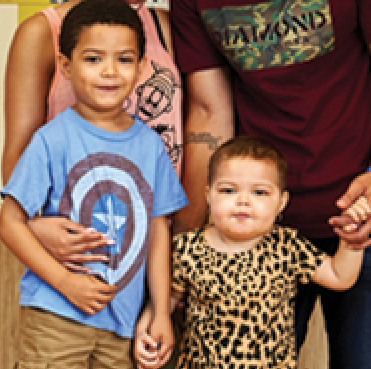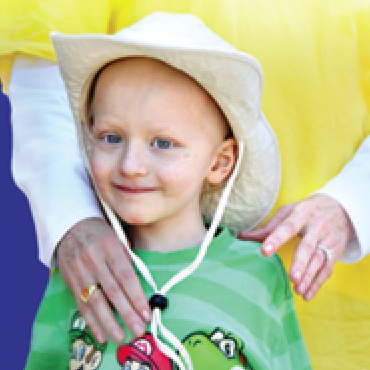As medical science allows us to become more proficient at saving the lives of pediatric cancer patients, their need for survivorship support in adolescence and adulthood has grown. Approximately two out of three children experience at least one long term side effect (late effect) of treatment. These side effects may affect any organ depending on the primary cancer diagnosis and the treatment the child received. These may include damage to the heart, lungs, kidneys, sexual organs, as well as cause psychosocial, emotional effects and learning difficulties. In addition, there may be difficulty in obtaining health and life insurance as well as possible discrimination in adulthood obtaining a job.
 With the remarkable strides made in curing childhood cancers over the past forty to fifty years, we are seeing what many refer to as “the first generation of childhood cancer survivors.” When he was 22 months old, Justin was diagnosed with stage IV Wilms tumor, a cancer of the kidney. After having his kidney removed, he underwent chemotherapy and radiation for 18 months after which he was considered cured. This was over twenty years ago. Today, Justin is a college graduate of Lehigh University, where he majored in business and computer science. He works at a start-up company that consults with clients on air quality monitoring and energy conservation.
With the remarkable strides made in curing childhood cancers over the past forty to fifty years, we are seeing what many refer to as “the first generation of childhood cancer survivors.” When he was 22 months old, Justin was diagnosed with stage IV Wilms tumor, a cancer of the kidney. After having his kidney removed, he underwent chemotherapy and radiation for 18 months after which he was considered cured. This was over twenty years ago. Today, Justin is a college graduate of Lehigh University, where he majored in business and computer science. He works at a start-up company that consults with clients on air quality monitoring and energy conservation.
It is estimated that there are approximately 375,000 adult survivors of pediatric cancer in the United States. While this is of course good news, as many as 60% of these individuals face a host of serious, chronic health, emotional, educational, career, and financial challenges, usually related to long-range side effects of their treatment. These challenges are known as “late effects.” Because this is a new medical phenomenon, “regular” doctors don’t know what to look for when a patient says, “I’m a survivor of childhood cancer.”
 For Justin, late effects involve his gastrointestinal system. When he was a freshman in high school, he began having excruciating abdominal pains. It took half a year for doctors to discover a stone was blocking a duct in his gallbladder and he had emergency surgery to remove it. Afterwards, going back through his old records doctors found a scan that showed the stone had been there since he was two years old, caused by his cancer treatments. Justin relayed that he "could have avoided six months of agony," had he been in a late effects program with oncologists and other doctors who specialized in treating the after effects of cancer, and had all his medical records been consolidated in one place
For Justin, late effects involve his gastrointestinal system. When he was a freshman in high school, he began having excruciating abdominal pains. It took half a year for doctors to discover a stone was blocking a duct in his gallbladder and he had emergency surgery to remove it. Afterwards, going back through his old records doctors found a scan that showed the stone had been there since he was two years old, caused by his cancer treatments. Justin relayed that he "could have avoided six months of agony," had he been in a late effects program with oncologists and other doctors who specialized in treating the after effects of cancer, and had all his medical records been consolidated in one place
In late effects programs, patients generally must be off treatment for two years (although this threshold may vary according to the type of cancer) and cancer-free. Ideally, patients will be referred to the program by their attending oncologist so as to ensure medical history is conveyed in full. The program staff may include but is not limited to physicians from the disciplines of oncology and hematology, gynecology, endocrinology, neurology, cardiology, nephrology and pulmonary medicine. Nurse practitioners are also integral to this program, as a nurse or highly specialized social worker is able to manage the complex data and administration for the purposes of closely monitoring every client in the program for his or her unique situation. The case managers are essentially the nerve center of a late effects program and must possess an advanced understanding of survivorship issues. They may refer patients to outside providers such as occupational therapists. In addition, late effects professionals should have access to ongoing research in order to provide the most up to date information on the long term effects of treatment. Each patient is unique and therefore their monitoring program must also be unique. In order to monitor these patients accurately, a complete physical, cognitive and psychological examination for benchmarking purposes is conducted.

Before Justin was to go through a late effects program, he had a host of unanswered questions. For instance, he asked, “What does it mean, long-term, to have only one kidney?” In addition to the gallstones, Justin had other chronic gastrointestinal disorders related to the treatment he received for his cancer. He has learned to self-manage his condition (such as through diet), but he had “never received any definitive answers or possible fixes. It is really frustrating.” He also hesitates to talk to people about his issues because, “I don’t have cancer anymore. Relatively speaking I’m doing great.” A few days before his first appointment at The Cancer Institure of New Jersey, Justin said, “[The Late Effects Program] is probably my best shot at learning how to tailor my life. I couldn’t be more excited to go into the program.” When he returned from the consult, he was filled with even more confidence, saying “They went through every aspect of my treatment and possible long term effects. Then I asked questions regarding my treatments and they gave me definitive answers, which was a first for me. Now I have a few things to take with me for my general physician to keep in mind, as well as a few packets that can help me on a day to day basis.”
Source: http://curesearch.org/Childhood-Cancer-Statistics









